
San Diego County’s Black Infant Health Program held its 10th annual Black maternal and infant health awareness event Saturday, August 20. Black Breastfeeding Week is August 25 – August 31.
By TJ Dunnivant
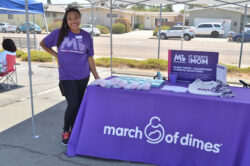
August is National Breastfeeding Month and August 25th through August 31st is Black Breastfeeding Week (BBW). Last Saturday, San Diego County’s Black Infant Health Program (BIH) did its part to help the community kick-off BBW and give new moms tons of resourceful information, food and gifts. BIH hosted their 10th annual awareness event at Valencia Park Elementary along with Global Communities Healthy Start. The combined effort was intended to raise awareness about San Diego organizations that are in place to reduce Black maternal and infant mortality rates and increase breastfeeding among the families in our community.
The vibe last Saturday was upbeat and festive as the DJ played hits like “Me, Myself and I” while horns honked at signs that said, “Honk for Black Breastfeeding.” Cowbells rang as each car drove through and received gifts and information. Bass-filled chatter, hand slaps, and laughter rang out at the Phi Beta Sigma, SDSU Fraternity Chapter booth, where they handed out food. They were clearly overfilled with joy to volunteer for the great cause.

Black Infant Health is funded and contracted through San Diego County and subcontracted through Neighborhood House Association, one of the largest nonprofit social services agencies in San Diego County. BIH Director, Iris Payne, was excited to introduce the co-collaborators of the event and talk about the importance of this 10th annual affair.
“Originally this was a collaboration with WIC (Women, Infant, Children),” Iris explained. “We all are here to celebrate and encourage breastfeeding throughout our community [WIC included].”
As Iris introduced Lisa Bayne from Global Communities and Janaia Bruce from Neighborhood House Association, they all were quick to speak about the disparities surrounding Black infant health and birthing outcomes.
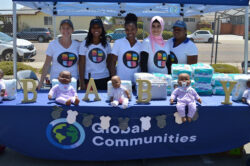
Janaia exclaimed: “Southeast is a breastfeeding desert.” Lisa proclaimed efforts to “eliminate Black infant mortality rates.” Iris shared how each collaborative is covering almost every need and she hopes that one day the rates of disparities will go down.
According to the CDC, annual death rates in the U.S. reach nearly 700 for women who give birth or for those within one year of giving birth. The numbers are grim for Black women: Black women are 3x more likely to die from a pregnancy related cause than white women. The statistics are just as great for Black infant mortality.
Eliminating Racial Disparities in Maternal and Infant Mortality, a report from The Center for American Progress (CAP) states:
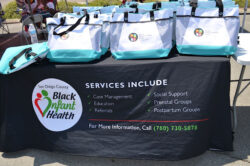
African American women across the income spectrum and from all walks of life are dying from preventable pregnancy-related complications at three to four times the rate of non-Hispanic white women,while the death rate for black infants is twice that of infants born to non-Hispanic white mothers. Black women are three times more likely to die from a pregnancy-related cause than White women. Multiple factors contribute to these disparities, such as variation in quality healthcare, underlying chronic conditions, structural racism, and implicit bias. Social determinants of health prevent many people from racial and ethnic minority groups from having fair opportunities for economic, physical, and emotional health.
Jessica N. Wade, Director of Maternal & Infant Health for the March of Dimes in San Diego County and a practicing local Doula, shared her own birth story of when her child was in the Neonatal Intensive Care Unit (NICU). She also informed attendees at Saturday’s event that 50% of pregnant moms in San Diego are on Medi-Cal. Wade is Director of Maternal & Infant Health Initiatives.
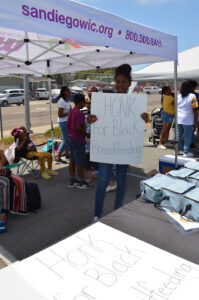
When asked why many NICU departments are unkind to mothers, Jessica said that they know that many families don’t know their parental rights. That conversation sparked Wade’s excitement about SB464 California Dignity in Childbirth Act, co-written by California Secretary of State, Dr. Shirley Weber, and SB 65 Maternal Care and Services, co-written by Assembly Member, Dr. Akilah Weber, M.D. of the 4th District.
Each bill changes existing laws to more accurately track maternal and infant mortality, however, SB 464 is mandating that delivery hospitals inform families of their rights against discrimination
based on race, color, and national origin and who to report it to when it does happen. SB 65 also increases maternal and infant mortality tracking and reporting. In addition, SB 65 increases access to birthing doulas, midwives and other advocating methods that will help decrease bias in the delivery room by allowing advocates to be by a mother’s side to inform her of her rights.
According to Wade, “SB 65 will mandate that Medi-Cal and other insurance cover the cost of receiving care from a doula before, during and after giving birth for up to 12 months.”
This is huge in the history of lawmakers that, at one time, punished doulas and midwives for delivering babies just to increase monetary profits by hospitals nationwide. As hospital births increased, so did mortality rates among mothers and infants. The Sundance film, “Aftershock,” on HULU explains the history in more detail.
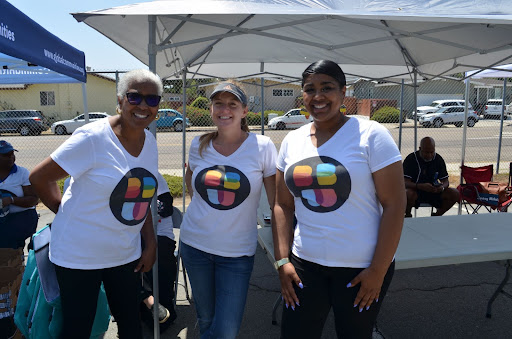
Other collaborators at the Saturday’s well attended event included WIC, Molina HealthCare, JIreh Providers LLC, and Ruby’s Loving Hands. Jireh Providers CEO, Samantha Williams was once a Nurse Practitioner but created her start-up during the pandemic to decrease health disparities within her community.
“As a Nurse Practitioner,” Samantha explained, “I wouldn’t see any real effort [of care for Black people] in the hospitals I was working in, so I set out to do it on my own.”
Jireh Providers goes out into the community to places like Jackie Robinson’s YMCA to check for high blood pressure, diabetes, Covid and other health disparities that afflict the Black community in San Diego. Williams believes her start-up is more effective in helping to decrease Black health disparities and hopes she can increase funding efforts to help her continue to do so.
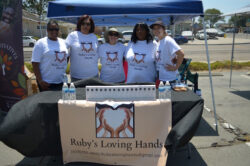
Ruby’s Loving Hands CEO, Ynez Hicks, handed out thermometers to participants. Hicks said her organization is a collective of volunteers. She currently has about 25 members that pay $25 a month for member dues. That funding goes to helping underserved teens buy dresses for prom, purchasing gift cards for seniors, and giving away baby bundles and the thermometers for the initiative.
Iris and other partners said The Voice and Viewpoint has covered this event and its efforts for a few years now. They believe that the event does a great job at spreading the word among participants. However, the story of the day’s efforts needed to be told to a broader audience, they said. We thank them for choosing us to carry out such an important initiative that informs others of their rights to be treated equally in their birthing planning, process and healthy outcomes.
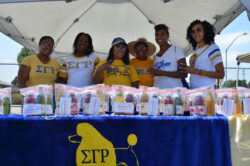
To get more information on accessing birthing information go to https://www.sandiegocounty.gov/content/sdc/hhsa/programs/phs/black_infant_health_program.html .


